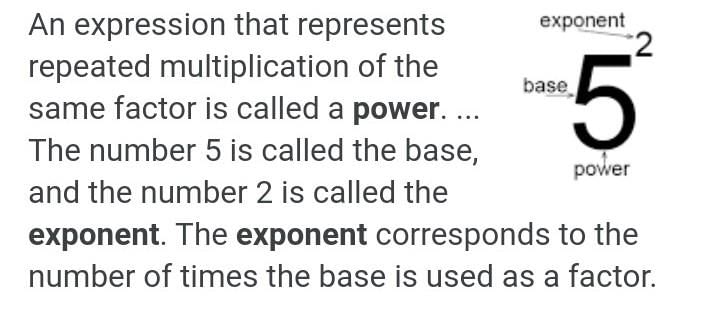Class 8 Exam > Class 8 Questions > What is difference between Exponents and Powe...
Start Learning for Free
What is difference between Exponents and Powers ?
Most Upvoted Answer
What is difference between Exponents and Powers ?

Community Answer
What is difference between Exponents and Powers ?
Exponents and Powers
Exponents
Exponents are a shorthand way of representing repeated multiplication of the same number. An exponent is represented as a small number written above and to the right of a base number. For example, in the expression 5^3, 5 is the base and 3 is the exponent. This means 5 is multiplied by itself three times.
Properties of Exponents:
- Multiplying Powers: When multiplying powers with the same base, you add the exponents. For example, (2^3) * (2^2) = 2^(3+2) = 2^5.
- Dividing Powers: When dividing powers with the same base, you subtract the exponents. For example, (3^4) / (3^2) = 3^(4-2) = 3^2.
- Power of a Power: When raising a power to another exponent, you multiply the exponents. For example, (4^2)^3 = 4^(2*3) = 4^6.
Powers
Powers are the result of raising a number to an exponent. The base number is raised to the power of the exponent to get the result. For example, in the expression 2^4, 2 is the base and 4 is the exponent, and the result is 16.
Relationship between Exponents and Powers:
- Exponents are used to represent how many times a number is multiplied by itself, while powers are the result of raising a number to an exponent.
- Exponents provide a compact way to write repeated multiplication, while powers show the final result of that multiplication.
- Understanding exponents and powers is essential in various mathematical operations, including simplifying expressions, solving equations, and working with scientific notation.
Exponents
Exponents are a shorthand way of representing repeated multiplication of the same number. An exponent is represented as a small number written above and to the right of a base number. For example, in the expression 5^3, 5 is the base and 3 is the exponent. This means 5 is multiplied by itself three times.
Properties of Exponents:
- Multiplying Powers: When multiplying powers with the same base, you add the exponents. For example, (2^3) * (2^2) = 2^(3+2) = 2^5.
- Dividing Powers: When dividing powers with the same base, you subtract the exponents. For example, (3^4) / (3^2) = 3^(4-2) = 3^2.
- Power of a Power: When raising a power to another exponent, you multiply the exponents. For example, (4^2)^3 = 4^(2*3) = 4^6.
Powers
Powers are the result of raising a number to an exponent. The base number is raised to the power of the exponent to get the result. For example, in the expression 2^4, 2 is the base and 4 is the exponent, and the result is 16.
Relationship between Exponents and Powers:
- Exponents are used to represent how many times a number is multiplied by itself, while powers are the result of raising a number to an exponent.
- Exponents provide a compact way to write repeated multiplication, while powers show the final result of that multiplication.
- Understanding exponents and powers is essential in various mathematical operations, including simplifying expressions, solving equations, and working with scientific notation.

|
Explore Courses for Class 8 exam
|

|
Similar Class 8 Doubts
What is difference between Exponents and Powers ?
Question Description
What is difference between Exponents and Powers ? for Class 8 2025 is part of Class 8 preparation. The Question and answers have been prepared according to the Class 8 exam syllabus. Information about What is difference between Exponents and Powers ? covers all topics & solutions for Class 8 2025 Exam. Find important definitions, questions, meanings, examples, exercises and tests below for What is difference between Exponents and Powers ?.
What is difference between Exponents and Powers ? for Class 8 2025 is part of Class 8 preparation. The Question and answers have been prepared according to the Class 8 exam syllabus. Information about What is difference between Exponents and Powers ? covers all topics & solutions for Class 8 2025 Exam. Find important definitions, questions, meanings, examples, exercises and tests below for What is difference between Exponents and Powers ?.
Solutions for What is difference between Exponents and Powers ? in English & in Hindi are available as part of our courses for Class 8.
Download more important topics, notes, lectures and mock test series for Class 8 Exam by signing up for free.
Here you can find the meaning of What is difference between Exponents and Powers ? defined & explained in the simplest way possible. Besides giving the explanation of
What is difference between Exponents and Powers ?, a detailed solution for What is difference between Exponents and Powers ? has been provided alongside types of What is difference between Exponents and Powers ? theory, EduRev gives you an
ample number of questions to practice What is difference between Exponents and Powers ? tests, examples and also practice Class 8 tests.

|
Explore Courses for Class 8 exam
|

|
Signup for Free!
Signup to see your scores go up within 7 days! Learn & Practice with 1000+ FREE Notes, Videos & Tests.
























